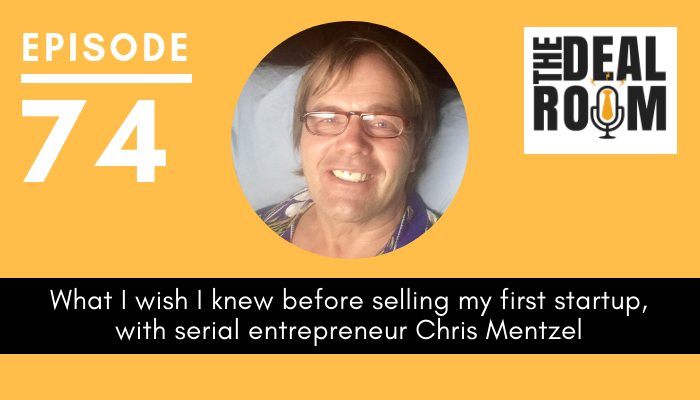
Chris Mentzel launched his first business with nothing but a business idea and a lot of gumption. He then grew this business and sold it for twice the amount he had initially dreamed of as his ideal exit price. Listen in and hear this serial entrepreneur talk about the things he wish he knew before selling his first startup. This episode is perfect for anyone who might be considering a business exit through sale.

Episode Highlights:
- How I became an entrepreneur
- The business idea that started it all
- Growing the business: the good, the bad and the ugly
- How I decided to sell my business
- Going through the business sale process
- Advice I wish I knew before selling my business
Joanna: Hi, it’s Joanna Oakey here and welcome back to The Deal Room Podcast, a podcast proudly brought to you by our commercial legal practice, Aspect Legal.
Today we’re talking to Chris Mentzel, a serial entrepreneur with a really interesting story to share, all about how he launched his first business with nothing but a business idea (and a lot of gumption!) He then grew this business and sold it for twice the amount he wanted.
Chris used this business sale to mould his life moving forward and created a really good life for himself. It’s a classic feel-good story filled with so much insights, encouragement and warnings for business owners who are in the midst of growing their business, or for anyone who is considering an exit through sale far into the future.
This episode is the first half of our two-part series with Chris. So sit back, relax and we’ll jump right into it.
Joanna: All right Chris look firstly I just want to say a massive thank you for joining us all the way from Maui. I am feeling, I have to admit, just a little bit jealous right now. Though Sydney’s beautiful, but I have visions of your surroundings in Maui at the moment. I’m a little bit green.
Chris: Very well. I love Sydney. I was there about 20 years ago and almost moved to Australia. Byron Bay was really calling me.
Joanna: Yeah.
Chris: But I had been in Maui before and Maui just pulled me back.
Joanna: Yeah, wow!
Chris: Got me this gorgeous natural beauty and wonderful energy with me.
Joanna: Yeah. Well how about we kick it off by talking about how it is that you arrived in Maui. I think the theme of what we’re talking about today is really about, as individuals as taking a long view of life. I think this is something that you mentioned as we were talking before we started recording and I think that’s a really good point.
I guess you did things a little bit differently so we’re talking today about a business sale that was quite a few years ago. But I think the important element or perhaps the interesting element is how you took the sale of your business and you used it to mould your life moving forward to create a really good life for yourself.
So maybe if you can give us a little bit of an overview and talk to us about that. Let’s go back 29 years or however many years it was when you started that business, that first business that you sold. Maybe take us back to that. What business was it and where are we in time at the moment?
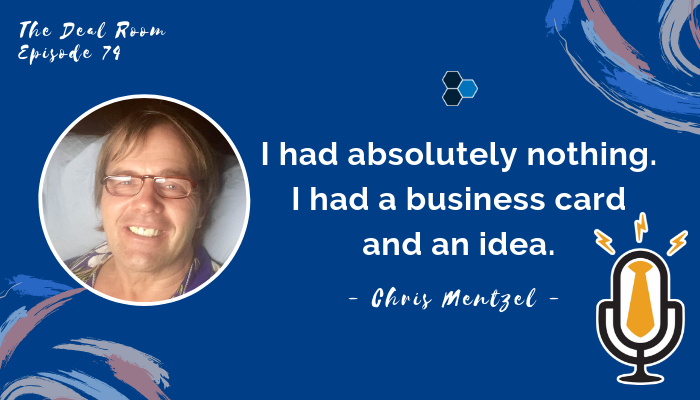
How I became an entrepreneur
Chris: Well, let me even go back a little further. Fifty years ago, I was growing up in Germany and I’ve watched all these advertisements that showed happy young people dancing under coconut trees. When I looked outside, it was raining, it was snowing, it was cold. I think that really deeply impacted me. That’s the only true reason that I can find why I wound up in Maui.
Go forward about 34 years ago, I was very interested in living my own life. I think that was not a product of the German system, but of spending one year in the United States. I was an exchange student there.
One day at lunch we talked about how you can work for yourself, not for somebody else, create your business, become independently wealthy. You’re familiar with all that now. But back then, in Germany that was not something people talked about.
In fact back then, in Germany it was everybody had a job. They were thinking of keeping this job for the entire time. Entrepreneurs were not really much of a career path at that point. But I really like that conversation and immediately decided I would never be employed.
Joanna: The entrepreneurial fire was lit way back then.
The business idea that started it all
Chris: Yeah, that’s when it got fired up. Next stop was I read an article about somebody who started a company, wrote a piece of software and sold that company for a million. That was cool. That made a real impression. I thought well that’s a good plan.
And then, half a year later, I discovered that the new technology was coming out. It was like sensational. It was like a hundred times better than what existed back then. This is 1984.
Joanna: And what was that technology?
Chris: In 1984, we had the first IBM PC had just gotten its hard drive and we were so excited. Five megabytes. Phenomenal!
So five megabytes. That’s about one photo right now, that’s one thousandth of five gigabytes. We were so excited having five megabytes. We wouldn’t really think of how could we ever fill that from working.
The new technology that came out was CD-ROM and CD-ROM had 500 megabytes of storage. Now to put that in our thinking back then. It was like you take the Bible, the biggest book that we have access to. You can put 100 bibles in 500 megabytes.
I was there on the day that this technology got introduced in Germany because the biggest computer fair at that time was in Hanover and immediately decided this is my ticket. This is what I want to do.
I had a Macintosh at home. Sensational. Right? And by now, it’s early ’85.
Joanna: Yeah.
Chris: My 128K Macintosh was able to print me a business card and a little flyer. Back I went to the fair, and I said we are a company solely specialising in CD-ROM. We create software for CD-ROM. We’re like the German specialists for this.
Immediately, those companies like Philips and Hitachi, two giants that were introducing these new boxes they had. They had no interest in writing software or working with customers. They wanted to sell thousands and hundreds of thousands of these boxes and so they were so happy that I was there, and took me to every possible fair, introduced me to their customers. I think in the first year I was at least in 12 different fairs talking to people about this.
Joanna: And was this just you in your business at this time?
Chris: At this time, yes. I was 27 years old. I looked like about 21, and I was talking to the heads of publishing empires. Some of them were 70 or 80 years old and utterly clueless and were so happy that they had a young person to talk to.
This was before the time the kids ran everything. This was still when a 27-year-old really wasn’t listened to.
I had a little bit of savings so the next step was I hired five people and we wrote software that this amazing thing of searching through 500 megabytes in a matter of two seconds and finding any word in there.
Of course, that’s nothing now, but back then it was really sensational to look for the Bible and find all the instances where certain words or certain sentences were.
Joanna: Right. So right in the beginning, when you went to the computer fair and you started this dialogue, at that point you didn’t have a product. You hadn’t developed anything. But you were just talking about the possibilities. Is that right?
Chris: Yes. I had absolutely nothing. I had a business card and an idea.
Joanna: Right.
Chris: I had no idea how we would program that. I had no idea if it would work. But I knew these people were hungry to find a solution to sell their boxes, get their boxes out there.
Joanna: Yeah. Right! Okay, and so you came with this big idea and a lot of gumption I guess at the time as you put yourself forward without having the product at that point. You’re able to get people who had a need, large businesses who had a need, to then start promoting you themselves through trade fairs. Then out of that, you had the confidence to build the company. Is that sort of how it worked? And then build the product.
Chris: And the other part is you really need that stupidity to not know that you could fail and therefore just to put one step in front of the other.
That’s a problem when you get older. You lose that stupidity and you get this idea in your head that you could fail. But if you just put one step in front of the other, you can wind up at amazing places.
Joanna: I love it. So then tell us about what the business did then. You had your five staff. You’re now developing the code. You’ve actually got your product now, which is great! You’ve got something to sell.
I like that you started with the customers first and then added something to sell. So then walk us through the evolution of this business.
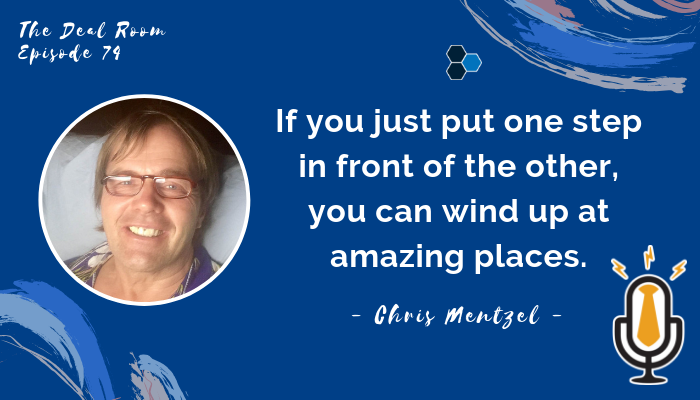
Growing the business: the good, the bad and the ugly
Chris: Yeah. Now we were the first company in Germany and probably worldwide that had a search system specifically for CD-ROM. So we went to all these fairs, made a lot of contacts and did a lot of the initial products and try outs for publishers.
We had a bunch of really big names in Germany, and did a really good working relationship with the big scientific publisher Springer. Probably known to most of you. It’s operating worldwide. We did card catalogue. I think it was worldwide. The first card catalogue on CD-ROM for university library. I think we did probably about 30 different CD-ROMs in a matter of four years.
Joanna: Wow!
Chris: We also built the first portable computer with a built-in CD-ROM drive and that was about in 1988.
Joanna: Right.
Chris: It was a big hit on fairs and to show off. Great thing to show off our capacity.
Joanna: And so what size did the company end up getting to?
Chris: Yeah. It was really beautiful. We have seven to eight people in the beginning. We knew each other. We were just sitting in one or two rooms, very intensely together.
As the business grew, we were 20 and at times 25 people. I must say I didn’t like it that much because suddenly we had to put in a hierarchy. It just wasn’t possible to manage 25 people all by themselves. And since I had never worked anywhere else, I was totally clueless about hierarchy and how to do that.
So yeah, that’s a typical number. Eight people is the size of the company you can really manage well together. I think if I were to do it again, I would really look out for help and get some coaching on growing the company and being able to manage a growing company better.
Joanna: Yeah, you’re right. I think the reality is many business owners who are growing go through the exact same struggles, particularly if they have been the founders of the business. Because it’s one set of skills to be able to create a business that’s capable of growth. It’s another set of skills that are needed to be able to manage that business as it passes through different levels.
From what I can see, they are also the danger periods for businesses. When you’ve grown so much that suddenly you’re hit with something like for example needing to add management layers and yet not having the skill set to know how to do that and not going and getting the right help at that time so that you can develop that skill set.
Chris: Yes. And for most businesses it’s cash flow. With me, we were 20 people and suddenly we had to bring in 100,000 or more every single month and that’s not easy.
We were mostly service oriented business and at times we needed 20 people and then there were months where we just needed five people. But the 20 people were on the payroll. They have to be paid every month and that got critical to a point that for the first time ever we went to the bank and got a loan to be able to go for these up and down phases.
Joanna: Yeah, to deal with it. So how many years into the business is this that we’re talking about now?
Chris: So now we are three to four years into the business. In the meantime, I had two children. In the beginning, I was more able to be there and be with them. But as the business grew, I would get out of the house sometimes 5:00 o’clock in the morning to fly to a meeting and come back at 11 o’clock. It wasn’t unusual to come back at 9:00 or 10:00 o’clock at night.
Joanna: Right. Okay, so you were really. I mean you were really burning it, and you had the new young kids which is, you know sleep is hard as well I’m guessing. I recall. Yes, in fact I’m still there now. Sleep is tough. It sounds like you probably were heading towards a point of exhaustion.
What happened with the business to lead it into sale? So when was it that you sold the business and why? How did that all come about?
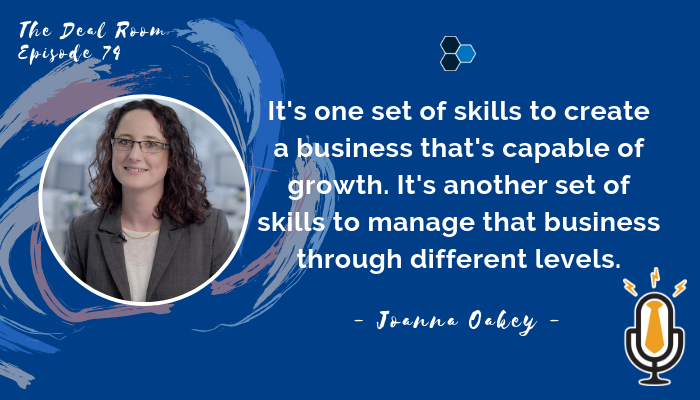
How I decided to sell my business
Chris: I felt how it became a strain on me. A lot of that was the financial strain. But also the late working hours. I think that’s a typical time, after about five years, entrepreneurs get ready to sell because you just can’t burn the candle on both ends that long.
At that point, my main customer was Springer for luck. One day they came to me and said they would love to invest in the company because they could see how we were growing and how we had fantastic customers. They thought this is the time to increase their capacity in new technologies and the best way to do that would be to be in this company.
And for me, that was an interesting decision because they wanted to come in with maybe 20% or 50%. But my feeling was that even if they only were a minority partner, just because they were a company of thousands of employees, they would always be in power.
At that point, I realised that if I wanted to bring them in, there was really no point in sharing the business because who else would I sell the rest of the business to. So I went back to them and I said I really appreciate it and I would like to sell the entire business and also ask for five times the money that they wanted to pay me.
Joanna: Very clever! How did you form your strategy at that point about how you would form your offer to them? Obviously, you’ve never done this before. You’ve never sold a business. Here you are, you’ve decided. You’re tired. You probably see this as an opportunity to maybe get out. But how did you work out the landscape?
Many people say to me there’s a lot to consider and particularly if you don’t know, if you haven’t done it before it can be confusing. Did you find it confusing? Did you find it overwhelming? What are the strategies you used to work out what to do?
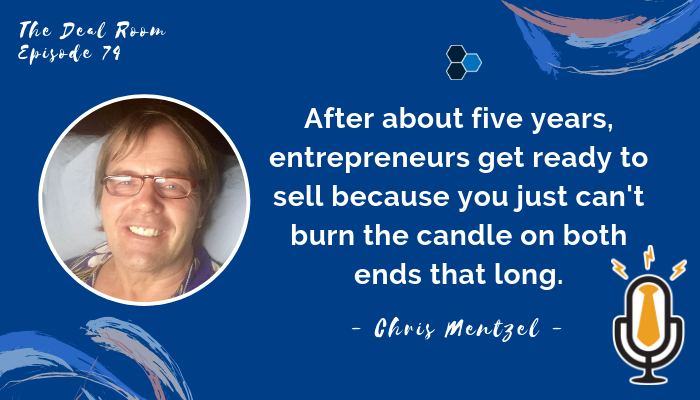
Going through the business sale process
Chris: I was very clear from the beginning that I couldn’t go into that alone. If I would have just tried to wing it, I would have not been able to do that. Luckily, I had a really good friend who agreed to help me and I paid him very little.
He came with me to all the discussions we had. He just watched there, mostly listening, sometimes bringing in his knowledge and then after the meeting, corrected me – what I should say, better say, what not to say – and looked at the paperwork.
That was an incredible help. It’s really important to have somebody professional look at it with you.
Joanna: Standing by your side.
You said you made an offer to them of effectively five times what they’d offered initially. Is that right?
Chris: Yeah, yeah.
Joanna: How did you come up with that figure?
Chris: Well at that time I had some minority partners. So I only had a part of the company. I figured I needed to pay taxes and I wanted to have this illusory 1 million that I read about in the article.
Joanna: I love it!
Chris: And so I calculated backwards and added a little bit more, and came up with well I really have to ask for 5 million so that in the end I get my million.
Joanna: Wow!
Chris: I miscalculated. I wound up with two.
Joanna: That’s fabulous!
Chris: That had to do with the specific tax structure.
Joanna: Right.
Advice I wish I knew before selling my business
Chris: That’s one thing that I would recommend to everybody to look at fairly early, even before they think of selling. Because at that point, Germany was not taxing capital earnings. If you owned less than 20% of a company, you had capital earnings taxes. So the partners, my partners in the business did not pay any taxes on selling the company.
And if I had known that earlier, I would have distributed my shares within my family or maybe close friends or further family and been able to reduce the taxes. I think it’s really a good thing to look at that like two or three years before possible sale.
That’s one thing I would recommend to you actually to give people information about it and say if you’re ever thinking that you could sell your business in the far future, here are a number of tips that I can email you to prepare for that.
Joanna: I’m so glad you say that Chris, because this is actually something that we talk about a lot. But I think at the end of the day, real experiences. I think you sitting there talking about your own story, people talking about the realities of what happens, the differences that it can make from actually following through and doing this, I think that in many ways appears to be more powerful than when I continue to say it.
So I’m really glad you mentioned it, because it’s real. Right? It’s real at the end of the day because it impacts what’s in your pocket and that’s what it’s about at the end of the day. Right?
Chris: Yeah. And it’s really something we did not see coming. I had a tax accountant. One of my partners knew a lot of things. We had studied for taxes. But we did not see that coming at all that they wouldn’t have to pay taxes.
Joanna: Wow. Okay, so it’s actually a change in legislation that had happened.
Chris: No. It was just that we always thought well we’re all owners of the business so we’ll pay the reduced taxes that we would save for being owners.
Joanna: Right.
Chris: And we didn’t realize that there was this 20% margin. Below that you wouldn’t be considered an owner.
Joanna: I guess it’s about getting the right advice. As you say, you weren’t even building or preparing for sale right at that point. It was sort of an offer that came to you that suddenly put this on track quickly. I guess in that is about getting the right advice, but being always in a sale ready state. So that if these offers come to you, you can take advantage of them and be ready for them.
Chris: Yeah. And it would have been probably too late, after the offer came in. I think the authorities would have looked at it a little strange if I would have distributed the stock between my family and myself. They would have said this is really tax avoidance.
Joanna: Yes.
Chris: But if that had happened three years before, there wouldn’t have been any problem and I would have saved a lot of taxes.
Joanna: Yeah. Wow! Okay. All right. Well, fabulous point. Maybe we’ll put a link in this to contact us if you’re ever thinking of selling your business or this might apply to you and we can give you some guidance of these sorts of things to think about in advance. And I meant that to our listeners obviously.
So you put this offer at five times. They accepted it. You went through the sale process. And firstly, how did you find the sale process itself? Once you had come to this agreement as to commercial terms, did it all happen quite quickly or was there a lot involved for you?
Chris: Well, in our case, I think we went for about eight months. We had meetings probably every month. It wasn’t that easy because they were running a big company. It’s not something that they have time built in for. So we had these meetings to get more familiar with each other and get a personal connection with each other. It was really nice in terms of there was not much discussion about the amount of money or how to invest. It was just about let’s talk about things together.
Joanna: Right. Well, it sounds like it was a nice transaction then at the end of the day. Obviously, you got what you had planned all these years before in terms of creating a company and then being able to sell out for, not the 1 million but the 2 million. So twice what your plan was. You must have been a happy camper, Chris. You must have been a happy camper.
Chris: I was very happy and just put us in a whole new status, a whole new feeling coming out of the cash crunch that most people are in that run a business and suddenly saying oh there’s a nice car at the corner. Hey, we could buy that car or we could buy that car; a whole different feeling.
Joanna: And you said that was 29 years ago so 2 million dollars must have been. I mean it’s a lot of money now. But it must have been a massive amount of money back then.
Chris: Yeah. It was actually 2 million marks at that point. Today companies sell for 50 million dollars like that. So I would say that’s the same feeling as maybe 15 million dollars would be at this point.
Joanna: Wow! Amazing! And this is a company that you built only over four or five years. Is that right?
Chris: Yeah.
Joanna: Yeah. Wow. Credit to you. It’s got to talk about the power of goal setting. Right? Right from the beginning you were clear about where you were going and you got there. Good on you, Chris! I love it. What a great story!
Chris: Yeah. Never start a company without a goal. You really have to do that. And for me, it’s also important that I had read this article and seen that it was realistic and that somebody had done it.
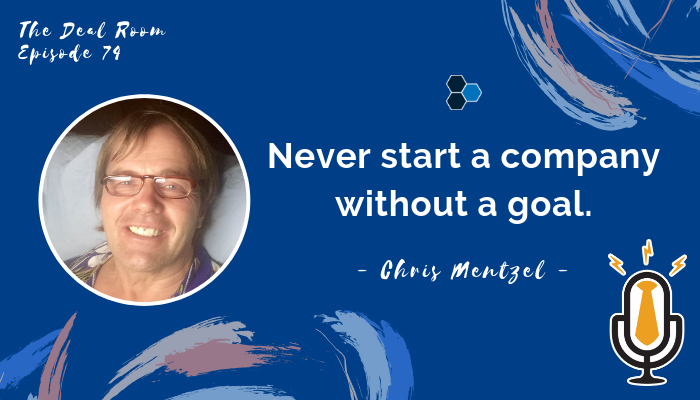
Joanna: Yes, right. It wasn’t just a pipe dream. You knew that there was a possibility of getting there.
Chris: Yeah.
Joanna: What a fabulous story, Chris! What we will do is we’ll come back in the next episode and talk about where you went to next and the beauty of life after achieving this goal that you’d set yourself. Maybe give some of our business owners out there some ideas about how they can set up a life on their terms, because I think that’s what it sounds like you did after the sale of your business.
Maybe we will also throw in there some business lessons from other businesses that you’re involved in. But thank you so much for coming on board today Chris and I’m really looking forward to talking to you in part two of this episode.
Chris: It was a great joy. Thank you so much.
Joanna: That concludes part one of our two-part series with serial entrepreneur, Chris Mentzel, where we discussed how he became an entrepreneur, and the business idea that sent him down that career path. We then drilled into some important lessons he learned from growing and then selling that business.
This episode puts emphasis on the sorts of things that business owners ought to consider as they build their business, especially if they’re considering an exit through sale sometime into the future. As a quick recap, here are three valuable takeaways from our discussion with Chris today:
1 Don’t be ashamed to ask for help. Indeed, starting and growing a business is hard enough. But this doesn’t mean you have to go through it alone. Chris talked about his struggles as the business hit that growth phase, where he then realised that he didn’t have the right skills to effectively manage a growing company. He also mentioned how helpful it was to have a friend assist him through the sale process.
2 Get educated on the sorts of things you ought to consider before you lead into sale. Chris mentioned his experience with specific tax structures and lamented how he could have saved so much more on taxes had he been given proper advice years before the actual sale. Scenarios like this one can easily be avoided by getting professional help or by taking advantage of free resources such as this podcast to get some helpful tips and advice from experts in this area.
3 Never start a business without a goal. Right from the beginning, Chris was always clear about what he wanted and that sense of clarity was pivotal in moulding his path forward to create a really good life for himself.
In part two, we’ll talk more about Chris’ life post sale where we cover the importance of a wealth management plan and the emotional tug-of-war he experienced at that point. To get notified when we release part 2 next week, head over to Apple Podcasts or your other favourite podcast player, and hit the subscribe button for The Deal Room Podcast.
If you need advice on a business sale transaction currently on foot or if you’re considering an exit through sale into the future and need help getting your business in a sale-ready state, we’d be more than happy to assist you. Take advantage of our free 20-minute discussion by checking out our show notes at thedealroompodcast.com where we’ll link through to our booking calendar. Simply choose a time and date that works best for you and one of our lawyers will give you a call, free of charge.
Thanks again for listening in! This has been Joanna Oakey and The Deal Room Podcast, a podcast proudly brought to you by our commercial legal practice, Aspect Legal. See you next time!
Our Business Sales and Acquisitions Services
Aspect Legal has a number of great services that help businesses prepare for a sale or acquisition to help them prepare in advance and to get transaction ready. And we’ve also got a range of services to help guide businesses through the sale and acquisitions process.
We work with clients both big and small and have different types of services depending on size and complexity. We provide a free consultation to discuss your proposed sale or acquisition – so see our show notes on how to book a time to speak with us, or head over to our website at Aspectlegal.com.au
Disclaimer: The material contained on this website is provided for general information purposes only and does not constitute legal advice. You should not depend upon any information appearing on this website without seeking legal advice. We do not guarantee that the contents of this website will be accurate, complete or up-to-date. Liability limited by a scheme approved under Professional Standards Legislation














